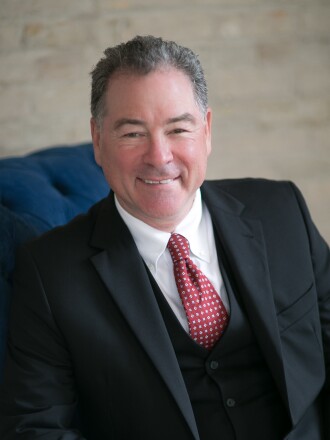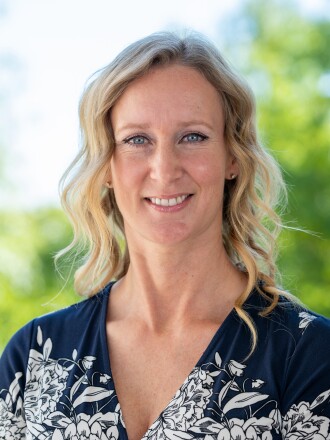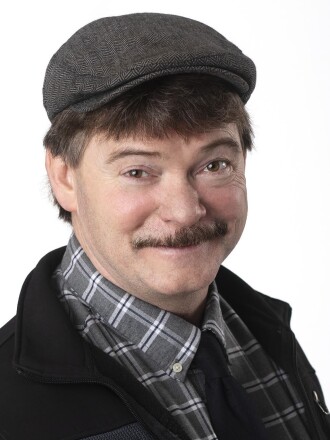BAXTER — Despite a series of disruptions from an audience member, Republican candidates for the vacant Senate District 6 seat fielded questions during a forum on Tuesday, April 8, at Forestview Middle School, ahead of the primary election.
The primary is set for Tuesday, April 15, when eight Republicans will face off for the seat. The winner will move on to the general election April 29 against DFL candidate Denise Slipy.
Republican candidates are Jennifer Carnahan, Steve Cotariu, Josh Gazelka, Keri Heintzeman, John Howe, Doug Kern, Angel Zierden and Matthew Zinda. Carnahan was not present at the forum due to illness.
Candidates are vying for the seat vacated by Justin Eichorn, who resigned last month after being charged with soliciting prostitution.
Brainerd Lakes Chamber of Commerce President Matt Kilian moderated the debate, asking questions about the economy, education, presidential policies, bipartisanship, budget and mining.
Candidates had one minute to respond to questions and were allowed two 30-second tickets they could use for additional time on any questions.
Opening statements

Up first for opening statements, Cotariu described himself as a veteran, small business owner and man of character. A lifelong Republican, he spoke of his years spent at West Point, in the army, in the corporate world and performing magic shows for kids in the hospital.
“I love this part of Minnesota,” Cotariu said. “If you like the way things are going, there are plenty of people up here you can vote for. If you want something different, that’s me.”
ADVERTISEMENT
As the vice president of a marketing firm and family man with a wife and two young daughters, Gazelka said he never planned to run for office. He said he felt a weight on his heart upon hearing about Eichorn and knew there would be work to do to rebuild trust across the party and the state.
“I don’t want to see this as a career,” Gazelka said. “I want to see this as an opportunity to give back to the community that has already given me so much.”
Keri Heintzeman, who spoke of her 25-year marriage and six kids, said she wants to see a better future Minnesota for her children. She noted her time homeschooling her kids, building a business in the community and fighting fraud in Crow Wing County through the Human Rights Commission with her husband, Josh Heintzeman.

“I’ve worked with the Republic party and have represented my conservative values throughout my time in the party,” Heintzeman said.
Howe is a retired veterinarian from Grand Rapids and described himself as a conservative Christian focused on restoring values and fighting back against government intrusion and overreach. Energy is one of his focuses, as he noted concerns with eliminating fossil fuels and relying solely on wind and solar energy to meet regulations set forth by Gov. Tim Walz
“I have expertise in areas that my opponents and the Legislature are lacking,” Howe said, noting his background as a veterinarian is beneficial in terms of public health.
Kern said he is an activist and owner of three businesses. He’s married with grown children and has spent 14 years as chair of the Crow Wing County Republicans. He said he has five elected positions right now and supported President Donald Trump in all of his campaigns.
ADVERTISEMENT
“I support faith, freedom, life and America first policies, election integrity, Second Amendment, businesses and the Never Again Bill,” Kern said, noting he believes the content of the bill should hold water, no matter who presents it.

The Never Again Act would strip the state’s governor of the ability to declare peacetime emergencies that can expedite mandates for business shutdowns and stay-at-home orders.
Working in the political sphere is something Zierden said she’s always been good at doing, having drafted her first bill 10 years ago and working across the aisle on legislation aimed at issues like pediatric medical device tax incentives and rural housing.
“There are all these things that we need to tackle,” Zierden said, noting housing, business support and health care. “But we have to have people who are going to go to the Capitol and knock on doors — not just on party doors, on everyone else’s door.”
Zinda described himself as a taxi driver, youth baseball and softball umpire and an investigative journalist, the latter of which led him to run for office. He spoke of his work on updating data practice policies at city and county levels.

“First Amendment speech rights, I’m all for them; some other people aren’t,” Zinda said, noting his support for the Second Amendment and opposition to SF 1596, which aims to prohibit the sale or transfer of semiautomatic military-style assault weapons in Minnesota.
Improving the economy
The first question asked what the Legislature can do to improve the economy, taking into account the rising cost of living and pressure on small businesses.
ADVERTISEMENT

Gazelka talked about how he drew ire on the fact that Minnesota has one of the highest corporate tax rates in the entire country, and they keep adding more laws, which make it difficult when running a mom and pop shop in the state. Gazelka said he would fight to stop the Paid Family Medical Leave Act and work to lower the state's corporate tax rate.
Heintzeman said she would work to get government out of the way and let Main Street thrive. She talked about supporting policies that serve both the local people and local businesses by working to lower taxes and reduce regulations that punish small businesses. Heintzeman brought up the Paid Family Medical Leave Act, talking about how it is hurting those same small businesses in the region.

Howe talked about how Minnesota has one of the highest tax rates in the country and to lower them, they would need to take on the DFL. Education is also highly concerning, with Howe saying he would fight all unfunded mandates as they put that burden on the district to fund. Howe said the district is unique, as it has everything from logging and mining to tourism, but they need to take care of the businesses that drive others to the region.
Kern said the people need to get out and vote. He talked about how the permitting process of business in the state can drive new business away. Kern mentioned lowering the corporate tax rates and wanted to stop the waste in St. Paul, mentioning the state went from an $18 billion surplus to a $6 billion deficit. He said when there is a surplus, it needs to be given back to those who paid in and not wasted in St. Paul.
Zierden said the problem with the economy is multifaceted when it comes to comprehensive tax reform, saying bipartisanship is needed to create meaningful reform. She talked about different tax brackets, broadening a tax base and creating permanent streams of revenue through sales tax, similar to what South Dakota does. She talked about putting business people in positions where they can use the information they have to lead government organizations.

Zinda said the federal government cut the corporate tax rate about four years ago, so he does not see that as an issue. He talked about working to save families money, saying an electrical inspector can come out to make you fix something even when the lights are already working. If elected, he would like to rip the statute away from the electric code, but would keep it for contractors. He also said corporations do not mind regulations as it keeps competition out of business. He ended with a desire to deregulate.
Cotariu said economic growth across the country and especially the region is driven by small business. For families to have good jobs and good places to live, then the regulations that burden those small businesses need to be reduced, he said. Housing is a challenge, as he said businesses pulled out of development in the region due to not having enough housing for employees, eventually stunting the growth in the region. He would like to reduce the regulations on landlords.
ADVERTISEMENT
Education
The next question asked how the state can better support students, teachers and schools across the state.
As a parent who homeschools her kids, Heintzeman said parents should decide what’s best for their children, and not the government. She supports school choice and said she believes tax dollars should follow students, as having schools vying for that money will raise the level of education. Students struggle with reading at grade level, she said, but school choice could help improve those metrics.
Howe said schools and the education system need serious overhauls, and unfunded mandates are a huge issue for schools right now. He supports a bill to allow schools to opt out of some of the state mandates. Each school knows what is best for its students, he said, noting stronger school choice and homeschool options are important.
Kern spoke of his opposition to diversity, equity and inclusion — or DEI — initiatives, saying equity is not the same as equality. He said he is concerned about Brainerd Public Schools losing millions in federal funding if it does not follow the recent executive order pertaining to transgender students competing in women’s sports. The money lost would have to come from somewhere else, he said, which would put an additional burden on taxpayers.
Zierden spoke of the trickle down effect of the education system, noting there is never enough federal funding for special education, so schools must take from their operating budget. Department of education employees, she said, used to take a more hands-on approach with subject standards, which is no longer the case. She also said seasonal taxbase replacement aid needs to come back to alleviate the tax burden on homestead properties.
Zinda said diversity is killing the education system in the area, saying it’s not going to work to put kids from different cultures together in one building under one administrator. He said he believes education should be privatized so schools can teach what they want and parents can have a choice on what their kids learn. The state should stay out of education altogether, he said.
Cotariu said there should be no unfunded mandates for school districts. If leaders in St. Paul think something is important, he said they should provide the resources to make it happen. He said he’d like to see more local decision making, as local leaders know best what their kids need. Requirements in this area should be different than in St. Paul, he said.
ADVERTISEMENT
With his oldest daughter soon to turn 5, Gazelka said education is something on the forefront of his mind, as he and his wife decide where to send her for school. He said he’s an advocate for school choice and curriculum transparency to ensure he knows what he’s sending his kids into. While excited for his daughters to participate in sports, he lamented the fact they’re growing up in a world where girls sports are no longer only for girls, saying he wants the best Minnesota for them.
Zierden used one of her extra 30-second tickets to add that people need to pay attention to local elections to ensure they’re investing in their schools at the local level.
Trump’s policies
Next, Kilian asked the candidates which of President Trump’s policies they support or oppose at the state level, as several of those running have referenced Trump in their campaigns.
Howe said the question was a good one but he wanted to again touch on energy, especially the Midcontinent Independent System Operator, also known as the MISO grid. He disagreed with the shutting down of the coal-fired power plants. Howe said if wind and solar would be added, it would require a $30 billion dollar transmission line installation and he doubts the Minnesota Department of Natural Resources would ever approve the permits. He said again the energy issue will become a serious problem unless steps are taken.
Kern said he supports the Trump era tariffs. He sees other countries taking advantage of the U.S., and Trump is using the tariffs and negotiations as a tool to hold trade partners accountable and bring them to the negotiating table to bring domestic trade back to the U.S. Kern said he would do everything in his power not to increase taxes. He also brought up schools not complying with regulations, which could lead to the federal government withholding funding from schools.
Zierden told the crowd her answer is multifaceted; she supports mining and Trump’s tariffs. She said one problem she had is she sees people move into office and immediately start cutting programs, and the trickledown problems arise from those cuts. She referenced the cutting of the Office of Justice Programs and how that was going to greatly reduce the budget of Brainerd’s domestic violence shelters. She recommended bipartisanship as a way to work on state and federal laws without greatly increasing taxes in the state.
Zinda said people are going at this backwards and policy should be at the bottom of the list. God is at the top, then the constitution, then U.S. code, then state statute, then local ordinance, then executive orders and policy all the way at the bottom, he said. He adamantly opposes the CARES Act, the economic stimulus package passed by Congress during the pandemic, and suggests flipping it around to give taxpayers a large tax cut and give businesses a much smaller tax cut temporarily to give the common man a chance to get off the ground. No new taxes will work if spending is not cut as well, he said. As far as working across the aisle, he said that is what led to the problem in the first place.
Cotariu said with great change comes great opportunity and risk, and that is currently being seen in education with the federal government pushing that responsibility to the state, giving the state the opportunity to make positive changes or blow it. Education should prepare students for one of three things that come after high school: college, trade school or joining the military, he said, and students need to be ready for these paths. He said trades are important, as there is a shortage in the state.

Using his extra time to answer the question, Gazelka said he supports all of Trump’s policies that are helping to create a free trade environment for business. He is looking to cut corporate tax rates in support of mom and pop businesses and make it possible for them to survive. He would like to cut the red tape and the needless permitting process in Minnesota. He sees the current permitting process as a reason businesses look elsewhere, saying the permitting process is about six times longer than surrounding states, costing the state around $900 million in lost revenue. With Minnesota as one of the highest taxed states, Gazelka said he would like to see the state create its own DOGE to find out where all the money is going and being spent.
Heintzeman said no administration is perfect. Both she and the people she has talked to while out doorknocking trust Trump. She said he is acting selflessly to clean up America and make it better for everyone. She is personally pro-life from conception to death, and she said Trump's economic policy is very good, despite what is being said. She agrees with his view on mining of the country's own resources as it is done safer and better than other countries.
Prior to moving on to the next question, Zinda said he would like to use his extension. Zinda talked about how Trump said he was going to cut foreign aid and he wishes Trump would have stuck to what he said. Instead, he cut all foreign aid to all countries except Israel, giving them $4 billion the day before the State of the Union. Zinda pointed out talking badly about Israel will lead Minnesota to stop doing business with them; however, the state would keep doing business with others who talk badly about other countries and entities.
A short break
Kilian called for a short break after the third question, after interruptions from the audience. He spoke with audience member Troy Scheffler, who interrupted speakers more than once up to that point, along with one interruption from another audience member.
Scheffler, who ran unsuccessfully for Crow Wing County Board in 2022 and for House of Representative District 6B against Josh Heintzeman last year, was later asked to leave the forum after he caused several interruptions by shouting and swearing while Keri Heintzeman spoke. After walking to the side of the room, Scheffler said he would stay there for the remainder of the forum, at which time another audience member put her hands on him and placed her hand over his mouth. Scheffler then said that was assault and refused to leave until a police officer took down her name and information. After the officer took her information, Scheffler left the cafetorium.
Bipartisanship
Given the near-even split between Democrats and Republicans in the state Legislature, the next question asked candidates how they would work across party lines to pass meaningful legislation.
Kern said he is willing to work with anybody on anything and mentioned the Never Again Act as a good example of bipartisanship. If legislators would have worked on that together before, he said kids would not have missed school, and citizens would not have lost birthdays and holidays due to the COVID-19 shutdowns.
Zierden said bipartisanship is more than just talking. It’s about trusting that everyone cares about one another’s concerns. Compromise, she said, is often looked at as a bad thing, when in reality Republicans need to be realistic about the climate of the state. She said the party needs people at the Capitol who can have a seat at the table and get things done, otherwise nothing will change.
In his response, Zinda criticized House Rep. Josh Heintzeman, first for traveling to the Twin Cities metro to campaign for other candidates in 2022. He said he does not think the area needs a husband/wife duo in the House and the Senate. He also noted he has heard it is sometimes easier going to Democratic committee leaders with concerns rather than Republicans.
Cotariu drew on his business background in mergers and acquisitions, which requires identifying top priorities and negotiating to ensure those priorities are met. That’s what legislators should be doing, he said — making compromises and trading out lesser items for more important ones to avoid a stalemate.
Gazelka said the other side is not evil, and legislators on both sides generally want the same things but disagree about how to get there. He said legislators can fixate too much on fringe items and “touchdown passes,” but that is not going to be successful in a state with Walz as governor. While Republicans can fight to completely ban abortion — which Gazelka said he wants to do — that will not result in a productive conversation with the other side. Instead, he said the conversation should start with funding pregnancy centers to help support new parents.
Heintzeman said she’s familiar with how committee hearings proceed, as her family is always in St. Paul along with her husband. She’s seen bipartisan efforts in action, she said, and understands how to make relationships and align on common ground. If Republicans are too focused on just the solution and not the root of the problem, then she said they are legislating in error.
Howe said legislators need to be reasonable people who can sit down and talk with other reasonable people. Republicans, he said, can’t come to the table as angry Republicans but need to earn respect. He said that’s what he did when he’s testified in front of committees, making him able to get his point across. He mentioned nuclear energy legislation going through the state right now, but said metropolitan Democrats likely will not support it.
Zierden used her last 30-second ticket to mention President Trump’s book, “The Art of the Deal,” saying it explains the president’s moderate views and how he surrounds himself with people of all viewpoints.
Audience question: With a $6 billion state budget deficit looming, what areas of spending can be cut?
Zierden said it starts with bipartisanship. With the DFL in control, they are responsible for making decisions on cuts, and they are not bringing Republicans to the table, which needs to change, she said. She added legislators need to look at fraud and waste but remain aware of the trickle down effect. Administration costs is another area she sees overspending in the government, but only one party making decisions is not the way to get things done to help everyone.
Zinda said conservatives never conserve anything. A few years ago, he said it was a sexual sin to engage in homosexual acts, and now it is OK. He then went on to talk about how all abortion used to be wrong, but exceptions were made over the years to justify a subsequent murder, saying an abortion is not good for a baby's health. As far as the deficit, Zinda said he is more libertarian-minded and believes a 20% cut of state government would be a good start.
Using his extra time, Cotariu said in business it is not uncommon to cut costs, as it is a normal thing to do. And the best way to do that, he said, is through zero-based budgeting, starting from the bottom and working up. Don't start with a percentage of cuts needed; that will hit more than is needed when there is plenty of waste that can be found. Don't give departments or the state last year's budget plus inflation; that's how waste is automatically built into a budget. A proper budget, he said, starts at the bottom with what is absolutely necessary to fulfill that function and works up from there. Cotariu said by doing this, one can find millions to billions of dollars of waste because the previous system let departments get fat and lazy without making them justify every dollar they receive.
Zero-based budgeting is a budgeting method that requires all expenses to be justified and approved in each new budget period.
Gazelka said he believes the government became too apathetic with the surplus they had, rolling out a plethora of new programs. He said first in, first out, as the state survived for a long time without any new programs. There need to be cuts, he said, as government programs only grow and never shrink. He pointed out these temporary programs continued to grow and stay on the budget with no accountability. They need to show what they are doing and what value is being added by the work they are doing, he said.
Heintzeman said there has been gross fiscal mismanagement by Walz and the Democrats, who turned an $18 billion surplus into a $6 billion deficit while also raising taxes. She plans on cutting wasteful spending by requiring performance based accountability from state agencies for every program and every tax dollar.
Howe said one of the first things to do is look at the fraud, claiming there is $600 million in fraud. He wants to stop using taxpayer funds for any abortions, saying in Minnesota a baby could be born on a table and they would let it die. He would like to stop supporting any illegal aliens in the state. He wants to stop funding all new and old programs as they always increase their budget.
Kern said as an appliance repair man, he understands the need for the right tool for the right job, and at the Capitol there is a need for the right tool to combat all the fraud and the abuse of funds. Kern said the tools he has are his ability to listen and to speak up against what is wrong. Kern learned of cutting off funds to nursing homes, asking how we can’t take care of those who took care of us. The cutting to nursing homes along with cuts to religious and private school is not where cuts should be made, he said.
Using his extra time, Zinda said in the 2024 election he spent $100 compared to Josh Heintzeman’s $21,000 in the race. Employee theft accounts for 80% of all theft, and it's the politicians — not the Democrats — stealing it, he said as he looked at the audience. Politicians, he said, are raising funds for legal fees and upon finding out they can’t use it for legal fees, they are not giving it back but dumping it in funds to launder before taking the money back out. Fraud and waste, starts with state employees, he said.
Also using her extra time, Heintzeman addressed Zinda, saying he lost over and over so many times in court, a judge awarded her compensation for attorney fees from Zinda. She mentioned his unnatural fixation with her and her husband, and his statements are not those of a serious candidate.
Audience question: How do you balance support for mining with environmental concerns?
Zinda said he was going to modify his answer as if the question was slightly different and spoke of his love for natural resources and desire for them to be here for future generations. But that can’t happen, he said, if shared natural resources are used for profit. He said he’s against fishing tournaments, guide services and any businesses that use natural resources for profit.
Cotariu said both mining and the environment are resources, noting the natural beauty of the area is an important economic driver. The two need to be balanced, he said, and if mining can be done safely without damaging natural resources, he said he is in favor of it.
Gazelka said he loves the clean lakes and natural resources of the area. But mining companies, he said, have to go through rigorous testing even after proving they can operate safely, which he said is a joke. His dad, grandpa and great-grandpa were all miners, he said, so he knows the great impact the industry can have. Mining and the environment are not mutually exclusive, he said, as Minnesota can have clean mining.
Heintzeman said miners care about the lakes and environment just as much as the rest of Minnesotans and she believes they’re doing what they can to make sure their practices are clean and effective. She said President Trump believes mining can be done safer and cleaner in the U.S. than anywhere else. Minnesota needs to support mining jobs, she said, and the permitting process mining companies go through needs to be quicker.
Howe said Minnesota does mining cleaner and safer than anywhere else. He spoke of his support for the Minnesota Miners Relief Act, which extends unemployment insurance benefits for steelworkers and their families impacted by recent layoffs at Hibbing Taconite Company and Minorca Mine. He said the problem the state often runs into is constant lawsuits from the DNR, which he believes is infiltrated by a lot of treehuggers, making it hard to get things done. Miners, he said, need to be supported in the best way possible.
Kern spoke of the lengthy permitting process mining companies endure to create jobs on the Iron Range — jobs that are much needed with the recent layoffs Howe mentioned. With mining efforts prevalent in Cass and Itasca counties, Kern said he would do everything in his power to represent the people of those areas well if elected.
Zierden said she absolutely supports safe mining and said permitting reform is a huge deal. It’s something, she said, that will take bipartisanship to get passed, just as so many other issues facing the state. Balancing that mining with environmental safety, she added, is important as well and critical for the Iron Range.
Closing statements
In closing, Cotariu said he is the only veteran in the race, which leads to why he is running, citing a popular military term of “lead, follow or get the heck out of the way.” He said he is tired of watching career politicians not doing what is best for the people, and that is why he stepped into the race. He told the constituents if they are happy with the way things have been running in the past, there are plenty of candidates on stage to vote for. But if they are looking for something different, someone who is not a politician and is not starting a career in politics, then he would appreciate a vote.
Gazelka started by saying he never envisioned himself running for office. He said he is no career politician. Those who vote for him can expect to elect a Christian, common sense conservative, someone who fights for you every day. He said he is running to serve his community, and a vote for him means he will fight tooth and nail to serve and represent the people. And those who don't vote for him, he said, can expect the same thing if elected. Win or lose, the community is important and he will do all he can to fight for it.
Heintzeman said she had the honor of working on the 2024 Trump campaign, and the concerns she heard while working matched the concerns she has had of being fed up with Walz and radical Democrats in St. Paul. She said she is ready to take them on and make sure they can no longer hurt Minnesotans. Heintzeman said she has the life experience and conservative track record voters of District 6 demand and deserve.
Howe said in his career he has known of three other veterinarians who served in the Minnesota government: Vernon Jensen, 1965-72; Douglas Carlson, 1971-72; and Steve Dille, 1986-2010. He said they had great things to add to the Legislature and were always called upon in Senate agricultural committees and for agricultural knowledge. Both house delegates in his district reside in the southern part of the district, and Howe believes someone needs to reside in the northern area of the district and not just make occasional stops in the north, as that does not help them better understand and represent them. A vote for Howe, he said, would best represent those industries and people.
Republicans are the party of freedom, Kern said, and freedom will always win if presented correctly. He said it's not the message that is wrong, it is the way the message is being relayed. He said the people have a First Amendment because of the Second Amendment. He then brought up all the people protesting against Trump and Elon Musk, asking viewers to think about what they were doing. He said they were protesting good health, exposing corruption, stopping forever wars, free speech, lowering taxes, gun ownership and open borders and still voting Democrat, which tells him the Republicans' message is not what it needs to be. The message itself is not wrong; it can be better presented to them, Kern said. If elected, Kern said he'd be at the Capitol using all the tools he has gained through life.
Zierden said she is running because she does want to be here and does want to be elected. She said she is due with her fifth baby in about 30 days. Though it was not an easy decision, it is one she wanted, as she has the ability to get things done and get them across the finish line. She has previously worked on legislation for education, housing and fentanyl, saying she has worked over the last 10 years taking her ideas to the Capitol and getting things to change. This is about working with others and with new ideas to get things done, she said, and she would appreciate a vote.
Zinda said public officials have one job, and that is to support the constitution. He talked of regulations; to him, regulations are restrictions. Paying people to enforce regulations is not cutting spending, he said. Zinda said he told Crow Wing County Sheriff Eric Klang when he was elected that he did not care if Klang made a single arrest as long as no constitutional rights were violated. And if so, Klang would again receive his vote. Zinda then said he wished Josh Heintzeman would stop intimidating officers when they express interest in voting for someone else.
THERESA BOURKE may be reached at theresa.bourke@brainerddispatch.com or 218-855-5860. Follow her on Twitter at www.twitter.com/DispatchTheresa .
TIM SPEIER, staff writer, can be reached on Twitter @timmy2thyme , call 218-855-5859 or email tim.speier@brainerddispatch.com .














